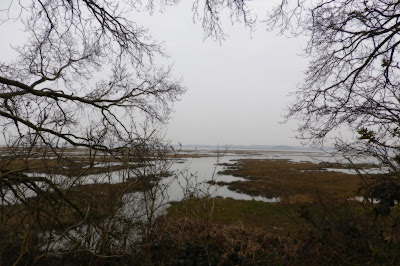Sea of Faith Conference 2016 and a thought or two about Arthur Hugh Clough's poem "Say the struggle naught availeth"
 |
| The evening tide coming in below Copperas Woods, near where I grew up |
But the invitation, naturally, served to send me back to Matthew Arnold's poem Dover Beach from which the name "Sea of Faith" is derived. That, in turn, sent me back to look again at a poem with a related theme by Arnold's close friend Arthur Hugh Clough (1819–1861). As someone who learned to sail on the creeks and inlets near the Essex village where I grew up, Clough's poem about the tide's turn and the water's (faith/religion's) silent and, at first almost imperceptible, return to the creeks and inlets has always struck me more powerfully than Arnold's. Also as John Beer notes in his introduction to Clough’s poems,
“While Arnold wrote of the slow withdrawing melancholy roar Clough was able to look on — however guardedly — with an optimism based on a further vision, recognising its relationship of renewal with the land it penetrates” (p. xv)
Although I'd describe myself as having a deeply melancholic strand in my makeup I've always thought Gramsci was right and that, although one may have a pessimism of the intellect it is always possible to maintain an optimism of the will. This only adds to my general preference for Clough's poem.
With regard to the Sea of Faith conference theme of "Religion, where next?" John Beer says something else in his introduction that seems relevant:
 |
| The evening tide coming in below Copperas Woods |
“Arthur Hugh Clough inherited problems that had beset thoughtful people since the end of the eighteenth century and the French Revolution, when the disillusionment that followed early idealism made it hard to continue in the path of revolutionary thought with any ease. The admonitions of writers such as [Edmund] Burke prompted a new sense of the good to be found in the previously existing order of Church and State; yet any return to the former state of things was equally difficult. Too many issues had been raised in the course of eighteenth-century sceptical writing, too many questions asked by the French philosophers, to make for an easy return to straightforward belief in Church and State as previously established” (p. x).
Anyway, enough said for the moment, and here, for your own reflections on the matter, is Clough's wonderful poem:
The labour and the wounds are vain,
The enemy faints not, nor faileth,
And as things have been they remain.
If hopes were dupes, fears may be liars;
It may be, in yon smoke conceal’d,
Your comrades chase e’en now the fliers,
And, but for you, possess the field.
For while the tired waves, vainly breaking,
Seem here no painful inch to gain,
Far back, through creeks and inlets making,
Comes silent, flooding in, the main.
And not by eastern windows only,
When daylight comes, comes in the light;
In front the sun climbs slow, how slowly!
But westward, look, the land is bright!


Comments